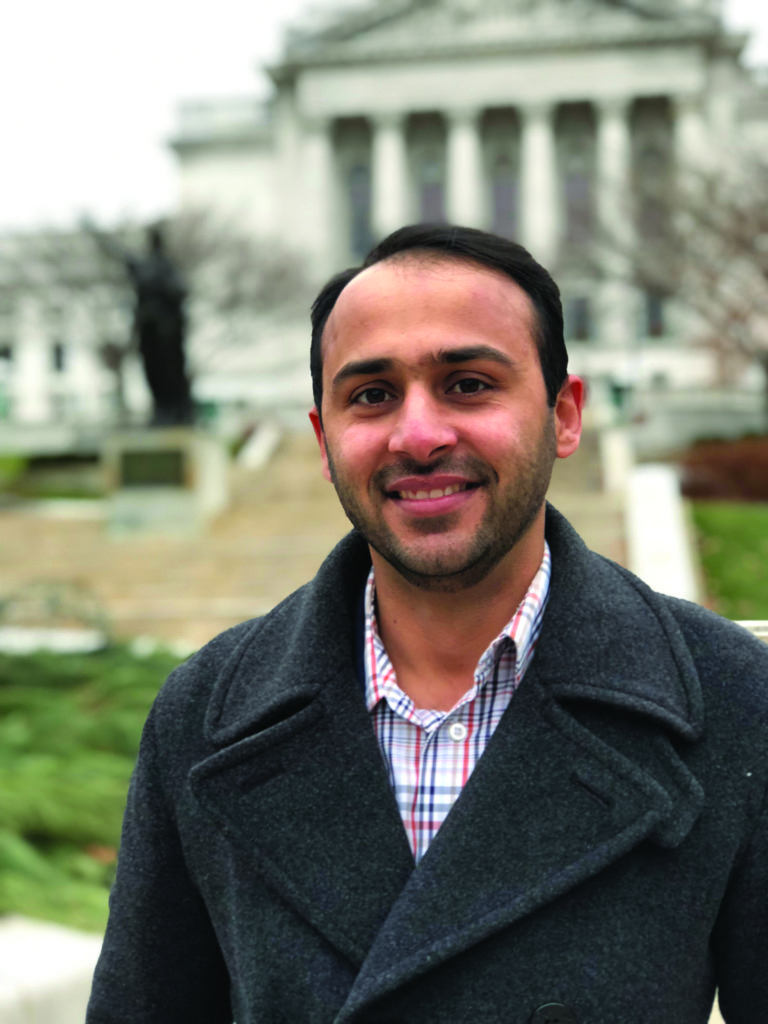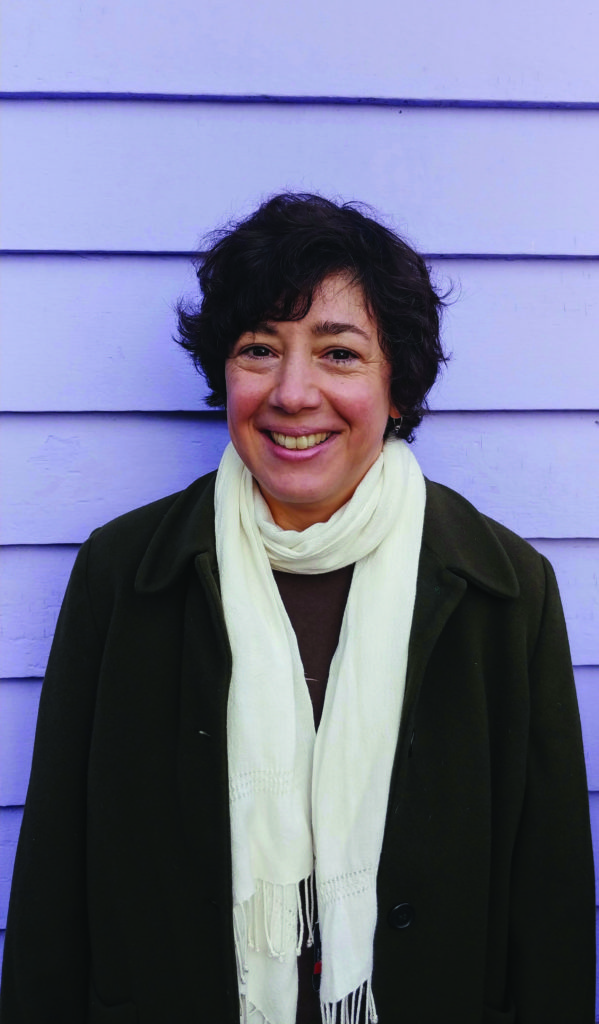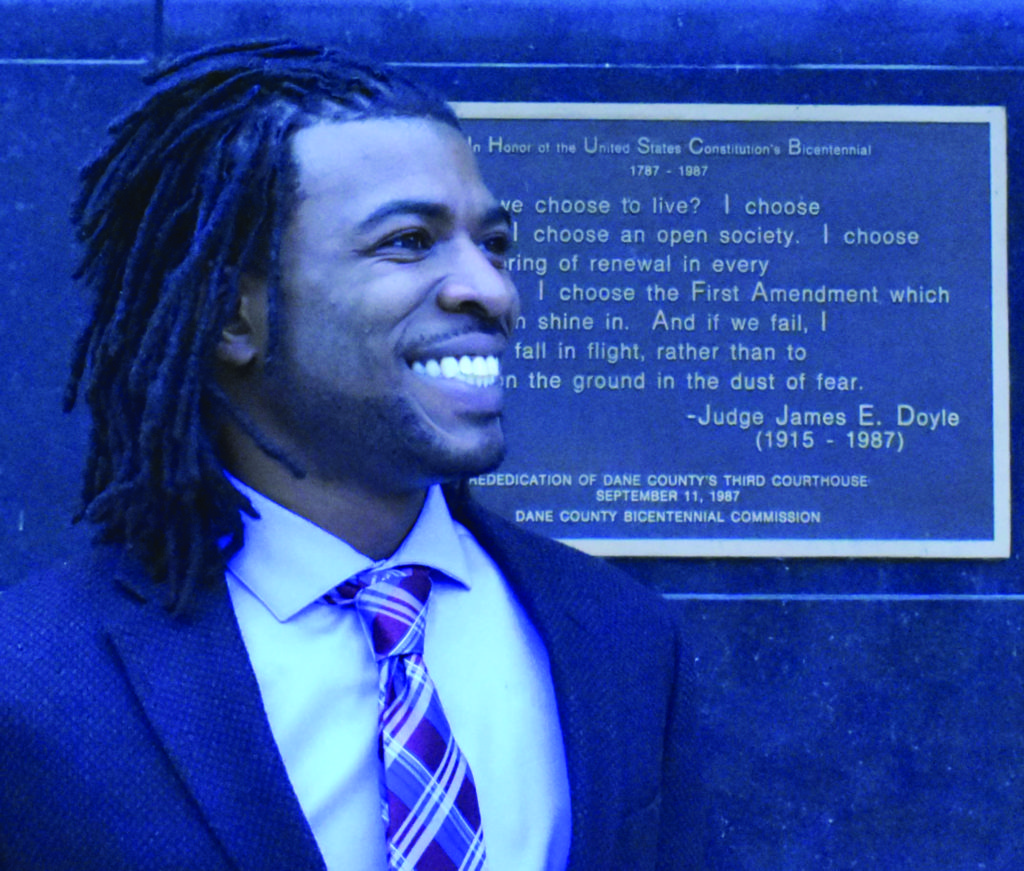
Residents in Madison’s District 12 will see a crowded ballot in the spring primary, with four candidates running for alder. Following is a brief Q&A in advance of the Northside Planning Council’s district 12 forum on Feb. 13, as well as an article featuring each candidate.
The Northside Planning Council sent candidates Syed Abbas, Diane Farsetta, Lydia Maurer and Anthony Whitaker the following question. Responses received by press time are published here and have been formatted for AP style, but not proofread.
Question 1: Community Input
Madison’s Northside is home to many highly-engaged community groups, from neighborhood associations to senior coalitions, environmental groups to youth groups. Many neighbors, however, express concern that they are not heard within the city’s decision-making process, or that the input they are asked for does not translate into action.
How will you involve community groups in city decision-making? How do you plan to demonstrate to your constituents that their opinions drive your council votes?
QUESTION 2: Affordable Housing Development
Affordable housing has become a hot topic in Madison with a growing population, rising income inequality, high rental rates and vacancy rates hovering at 2 percent. Many residents are no longer able to afford to live in the city. Often redevelopment zones with affordable unit requirements fall in areas like the Northside, where more land is available, but where there is also already a high density of low-income residents, reinforcing the City’s historical pattern of housing segregation.
What policies will you implement to balance the need for more affordable housing with the need to desegregate Madison’s neighborhoods and schools?
QUESTION 3: Transportation
The Northside is woefully underserved by public transportation, and many of our residents face hours-long bus rides to get to jobs across town. The Northside needs leadership committed to improving our access to the rest of the city.
What is your plan for improving transportation access on the Northside?

Syed Abbas
Question 1: Community Input
My vision for District 12 is a vibrant, safe community promoting racial equity, with affordable housing, diversity in the local economy and green space. For a long time, neighborhood voices from Brentwood Village and the northside haven’t been heard. When I am on the city council, I will build bridges in my community, listen to all my constituents’ voices and advocate for all neighborhoods. I will bring real change and answers to our district.
As co-chair of Eken Park Neighborhood Association, I listened to my constituents and acted on their behalf when needed. As an example, when concerns about Washington Manor Park’s infrastructure arose, I took action with the city by fostering the process to get new equipment for the park. When my neighbors were concerned about drugs and violence, I acted by creating an outreach committee which created a dialogue with the local community and other stakeholders as well as connecting them with the right resources to get their voices heard.
While running my campaign, I’ve connected with members from all the district communities and met with all levels of local stakeholders. This is one example of how I plan to involve community groups and my constituents in city decision-making when I’m on the city council. I will build partnerships by reaching out to neighborhood associations, local teachers, housing and social work managers, area voluntary organizations, civic associations, nonprofits, schools, businesses, community groups, the local community police officers, faith communities, local community leaders and other key stakeholders.
I want to enhance and restore the trust residents have in local government as well as make them feel a sense of belonging here. I have a record of listening to my constituents’ voices and taking action on their behalf because I care, and that record will continue.
QUESTION 2: Affordable Housing Development
Affordable housing should be a basic right. Quality housing is at the root having a strong community where residents can have access to education, safe environments, healthy food and opportunities to thrive. We must create community-focused affordable housing designs where we provide more than just a roof over people’s heads. We need to see a broad range of policies such as affordable child care, access to efficient transportation systems, energy efficient buildings, clean water without contamination of PFAS, community centers and, most importantly, providing job opportunities to help families succeed.
With energy efficient building designs there are many advantages, such as: reduced utility bills, positive impact on residents’ health, resilience and pride in their homes when paired with an education program that helps residents understand benefits. We must consider green spaces and creating community gardens where residents can grow their own veggies, feel connected with their surroundings, and are encouraged to take care of their own properties, building a sense of belonging along the way. Also, I’d like to see buildings with a smaller number of housing units, so people can get to know their neighbors more easily, where people are seen not as a number but as the individuals that they are.
Additionally, the city should work on creating more market rate co-op housing to support our middle-lower middle class. Not only do we need affordable rental properties, but we need a clear, affordable path for low- and middle-income families to become homeowners.
I believe by improving unemployment rates in conjunction with providing affordable housing, we truly can help our communities thrive. District 12 is on the horizon of major economic development and we need to think about everyone in our district, helping the disconnected communities by creating workforce / affordable housing and providing them with economic opportunities.
QUESTION 3: Transportation
The Northside is disconnected from the rest of Madison’s pedestrian, bus and biking opportunities. There are many dead ends on our bike paths and sidewalks, these paths are created on unsafe, major roads and they are poorly maintained. We need to make our paths safe and accessible so that all forms of transportation can coexist.
Currently, people wait for long periods of time to get a bus ride and these rides consist of several buses to get into the city from the North Side. This leads to lack of use and reliability for users of public transportation. Additionally, bus stops are not conveniently located or maintained so that people can safely and adequately get to the stops for rides. This is a problem for our growing elderly population as well as members of the disabled community. I have also seen that many bus routes on the Northside don’t have bus stop shelters. I will advocate to develop bus stop shelters so people feel comfortable taking public transportation during extreme weather. Creating new transportation solutions will allow each resident to feel connected to the rest of the city and bring new opportunities into our district.
While I served on the Oscar Mayer Strategic Assessment Committee, I saw firsthand the need for updated public transportation. A major factor of this development proposal was public transportation and the ways in which we can update, integrate, and expand our services in this district. The Bus Rapid Transit (BRT) which provides a high-quality limited stop transit system delivering fast, comfortable, and cost-effective services to the residents of Madison, will be extremely important to our district, particularly with the redevelopment of the former Oscar Mayer site. I will advocate for opening the BRT route to the Northside and bring more public transportation-friendly policies.

Diane Farsetta
Question 1: Community Input
One of the reasons I am running for City Council is to ensure that District 12 has effective representation that’s responsive to our neighbors. Over the next few years, the City Council will make decisions — including around the Public Market and Oscar Mayer redevelopment — that will shape work, housing and transportation options in our area.
To me, effective representation includes: (1) Providing easy-to-read information about upcoming decisions and updates on ongoing efforts; (2) Encouraging public input, by making clear the process and timeline for public comment, by responding promptly to emails and calls, and by discussing issues at the meetings of community groups; (3) Working to address neighborhood concerns that fall outside of government agendas, since not everything has a policy response; and (4) Reporting back regularly on what I’ve heard from neighbors, other relevant information, the actions I am taking and my reasoning for those decisions.
If elected, I will also support public engagement more broadly. I will encourage neighbors to serve on city committees. I will work to ensure that city programming, like the Neighborhood Conferences, reflects the interests and needs of our area. I will call attention to the contributions of our community groups.
My experience as a neighborhood and grassroots activist makes these issues important to me. As the executive director of the Wisconsin Network for Peace and Justice, I worked with member groups to advance their agendas on the state level. As a volunteer at WORT community radio, my public affairs shows broadened debates and encouraged listeners to take action.
Policymakers make better decisions when they hear diverse voices and question assumptions. The City Council, as the level of government closest to the people, can and should prioritize making public engagement easier and more meaningful for more people.
QUESTION 2: Affordable Housing Development
Neighborhoods, schools and workplaces all benefit when there is enough quality housing for families at different income levels. As Alder, I will support development proposals and policies that ensure a mix of market rate, workforce and affordable housing.
I will draw on data regarding the current housing mix and unmet needs in our area. For example, families seeking affordable three-bedroom units in Madison may be on wait lists for as long as three years. Such housing insecurity destabilizes our neighborhoods and schools.
City planners tell us that Madison will need 40,000 more housing units by 2040. It’s great news that the city’s Affordable Housing Fund is on track to meet its first five-year goal. However, that goal is to add 1,000 units total over five years, which is not enough to meet our current needs, let alone address the growing pressures on our housing market.
To increase available funds for affordable housing, I will explore revolving loan funds, general obligation bonds and development impact fees. I support establishing community land trusts, the same approach used by Troy Gardens Cohousing. Community land trusts allow for permanently-affordable residential and commercial spaces, even in areas of rising value. The city should also encourage private sector responses, such as cooperative or or other house-sharing arrangements, and improvements of existing affordable housing.
As we work towards a mix of quality housing options for our area, we need to add market rate and affordable units at different levels. Affordable housing is defined relative to the middle-range or median income for the area. In a higher-income area like Madison, affordable units at 80 percent of median income can allow firefighters, nurses and retail workers to live in our city.
QUESTION 3: Transportation
Expanding transportation options is a priority for me and must be one for our city. As Alder, I will improve access to public transportation on the Northside while laying the groundwork for effective regional transit.
As Madison grows, our roads and bus routes are increasingly stressed. Investing in public transportation widens our neighbors’ housing and employment options while keeping household costs down. Public transportation is more environmentally sustainable. It also allows people who are unable or unwilling to drive to be involved in our community.
I will expand transportation options on several levels: optimizing our current bus system, linking systems for commuters, strengthening bicycle and pedestrian networks, and working towards bus rapid transit.
As a bus and bicycle commuter in Madison for 25 years, I know the limitations of our current system. I support expanding Madison Metro service and reconfiguring bus routes to better serve the Northside. Citywide, while bus ridership increased 40 percent over the last decade, bus service increased by less than one percent each year, according to the Madison in Motion report. This must change.
As Alder, I will expand collaborations with employers to link bus routes and regional shuttles, and add park and ride areas to ease workplace commutes. I will seek opportunities like the Oscar Mayer redevelopment to connect bicycle and pedestrian paths. By making these paths more usable, we will add options for people to safely travel to school, work, offices or stores.
I strongly support Madison seeking federal funds to add a bus rapid transit (BRT) system. BRT will provide faster and more direct service, especially for longer-distance commutes. As proposed, the East and North BRT routes will serve District 12. BRT will also allow us to redirect some “regular” Metro bus routes to currently underserved areas, like the Northside.

Anthony Whitaker
Question 1: Community Input
Do you know your Alder? The answer, often, is a blank stare; a face scrunched in concentration of some half-remembered fact. Then, a light bulb! And the name of the wrong Alder. We’ve let our local government off the hook for delivering on the issues that matter most to our community. I want the opportunity to change that. I believe in responsive and responsible government that answers to the community. Constituents should not only know their local representative on the Common Council, that representative should be accessible, approachable, and alert to the issues in the community.
As Alder, I will commit to holding a monthly roundtable with the leadership of all community groups in the district. This will allow me to understand the issues that are impacting our communities and come up with solutions together that work for everyone. In addition, I will also commit to holding a monthly open forum with the general community to answer questions and seek input on current council business. Constituents must know that their government cares about their concerns and will work with them to solve those issues.
I cannot be at all meetings that occur, nor can I commit to being at every community event. What I can promise however, is that I will be an engaged, open-minded voice on the council. I will ensure that no voice is too small to be heard, that no one is left behind, and that everyone has a government that responds to their needs. We should all trust our government and know that when we speak, all our voices will be heard. I will bring that back to the Common Council.
QUESTION 2: Affordable Housing Development
Madison must tackle its issues with racial justice and equity if we are to integrate neighborhoods and communities. Our history of segregating Black and poor residents is long and shameful but can be resolved if we work to uproot biases in zoning, developments and contract awards, and even community prejudices, that prevent us from achieving true integration. Our housing crisis solutions must focus on the root causes of historical bias and discrimination, but we must be honest about what solutions to those issue will look like.
My policies would focus first on increasing home ownership for residents who have experience historic patterns of discrimination. These policies would focus on down payment assistance, credit repair, and grants for home improvements for low income populations. These programs will help move low income residents, especially Black residents, into their own homes, helping to reduce both wealth disparities, and housing segregation.
Next, I would ensure that any new rental units focus primarily on mixed income families. Too often we push “affordable housing” which often leaves only low- or moderate-income families, further widening an already gaping chasm of racial and income disparities. We should re-focus our attention on bringing low income residents into contact and spaces with high income residents.
Finally, I would ensure that Seniors could stay in their homes as they age by advocating for budget increase for programs that allow seniors to retrofit their homes for accessibility and to keep up with the costs of homeownership. We must also ensure that when seniors do choose to move, there is adequate senior housing to meet any new demand. In addition, we must also ensure that those who work with our Seniors are well paid, well trained, and dedicated to ensuring a safe and welcoming environment.
QUESTION 3: Transportation
I envision a regional system that connects the entire North and East sides to the rest of the city and surrounding communities. A system that connects neglected neighborhoods to job opportunities and includes more frequent service, is faster, more reliable and offers safer transit options. However, this system may take years to complete. Northsiders especially need better options today. I would advocate for more frequent bus routes and 24- hour operating times to increase public safety overnight. Our citizens work at all times during the day and night. We should have a transit system that works as hard as they do.
As our city continues to grow, we must develop a system that connects riders to jobs, businesses, and recognizes that all residents are differently abled. I will advocate for increased funding for paratransit services and more express routes between different sides of the city. Multiple hours long journeys across town, often broken up only by transfers between routes, should be unacceptable to any resident that values fairness and equity. Our transit system currently operates to primarily service the downtown area and the UW. This is an unacceptable service level and cannot continue if we want to maintain cohesive communities.